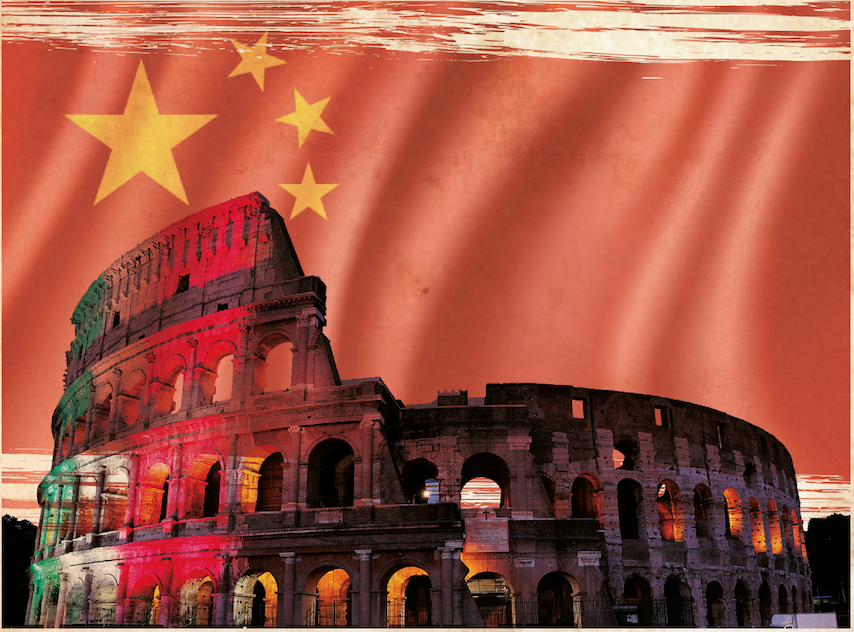Hijacking the Mainstream: CCP influence agencies and their operations in Italian parliamentary and local politics
Policy brief by Sinopsis and the Global Committee for the Rule of Law “Marco Pannella”.
By Livia Codarin, Laura Harth and Jichang Lulu
Whereas Italy’s 2019 accession to Xi’s geopolitical project of the Belt and Road Initiative and the overt alignment of some high-level politicians in Italy has made headlines, little attention has been paid to the larger mechanisms at work behind these operations and the gradual take-over of Italian mainstream opinion in a soft yet persistent alignment with the CCP’s global objectives. While recent public statements by government officials appear to signal a return to a more firm stance within the Atlantic Alliance, reality on the ground suggests this diplomatic U-turn is often little more than a façade as CCP propaganda memes continue to resurface across the full Italian political spectrum, evidencing the success of influence agencies’ quest to install a new “common sense” catering to the CCP’s geopolitical ambitions.
A recently leaked draft triennial plan for strengthening cooperation 2021-2023 between the PRC and Italy reaffirmed the latter’s commitment to “linking” BRI to EU strategy, “mutually beneficial” cooperation. Notably, such commitments also continue to include the joint promotion of the Beijing 2022 Winter Olympics, a commitment expressly echoed in the PRC read-outs from the latest bilateral call between Italian PM Draghi and CCP Chairman Xi. A most recent video-conference heralding CCP policies in Xinjiang, attended by the Chairs of the Foreign Affairs Committees of both Houses of Parliament, further illustrate the ongoing success to coopt and shape mainstream political and public opinion in favor of the CCP’s totalitarian rule.
“Hijacking the Mainstream” – CCP influence agencies and their operations in Italian parliamentary and local politics (in Italian “Una Preda Facile” – Le agenzie di influenza del PCC e le loro operazioni nella politica parlamentare e locale italiana) provides the first overview of the Italian activity of external influence agencies across the systems that compose the CCP-led apparatus, including three case studies that illustrate multi-system operations targeting Italian politics from the national to the municipal level. The CCP International Liaison Department (ILD), the Chinese Association for Friendship with Foreign Countries (CPAFFC), the China Council for the Promotion of International Trade (CCPIT), as well as units in the party’s propaganda and united front systems and fronts linked to intelligence agencies, the cases show, are key actors in efforts to coopt parliamentarians, political parties, local officials and mainstream voices in think tanks and the media.
Using politicians, lobbyists and other local intermediaries as proxies, these operations repurpose democratic institutions as instruments of CCP policy. Vague appeals to ‘friendship’, ‘culture’ and trade help enlist mainstream, often CCP-critical figures as unwitting endorsers of a discourse-engineering endeavour: the installation of propaganda memes that normalise the CCP’s totalitarian rule and global expansion. Surrendering policy-making creativity to this new common sense, parliamentary circles have relayed propaganda whitewashing CCP’s human rights abuses, while local governments joined a ‘Belt and Road’-themed network set up by a CCP influence agency.
The knowledge asymmetry between CCP influence agencies and their targets is a vulnerability these operations exploit. Unfamiliarity with influence agencies and tactics compromises the integrity of political institutions by making them easy cooption targets. Effective policy-making towards a balanced relationship with China requires knowledge of CCP influence work.
Policy-makers have tools at their disposal to address these vulnerabilities:
1. Government bodies and political parties should build a cordon sanitaire around the CCP’s influence agencies, avoiding interactions that turn them into their instruments.
2. Senators and MPs should reclaim Parliament from totalitarian cooption, declining to endorse parliamentary ‘China friendship’ groups and other platforms acting as effective proxies for the ILD and other CCP influence agencies.
3. At the local level, authorities should focus exchanges with PRC counterparts on legitimate issues within their competencies, avoiding induction into propaganda initiatives pursued by CPAFFC, CCPIT and their local facilitators.
4. Bodies such as the parliamentary security and foreign affairs committees and individual legislators should investigate CCP influence operations, bringing transparency and accountability by scrutinising government exchanges with PRC counterparts and publicly disclosing their own.
5. Parliamentary bodies and political parties should use regular briefings to make up-to-date research on CCP influence available to parliamentarians and local officials.
6. A democratic consensus across the political spectrum in Italy and its allies should support an adaptation of the legislative framework to effectively counter foreign interference.
Read the full report in English here.
Clicca qui per la versione integrale in italiano.
*Cover credit: Finn Lau and Hong Kong Liberty
***

